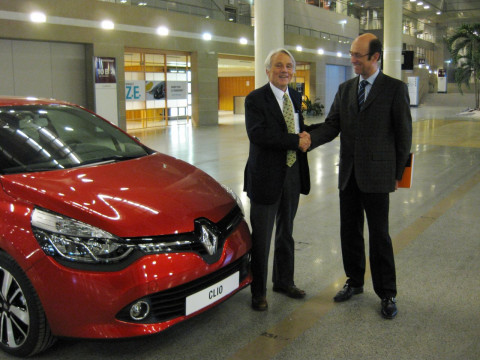Renault and ESI Group sign a framework agreement for strategic collaboration
ESI Group, pioneer and world-leading solution provider in Virtual Prototyping for manufacturing industries, announces the signature of a framework collaboration agreement with Renault.
The agreement aims at supporting Renault's new strategic plan “Renault 2016 – Drive the Change”, founded on Renault’s ambition to make sustainable mobility accessible to all. The industrial challenge Renault faces is to improve the quality of its vehicles, while lowering prices and complying with new regulations aimed at reducing their environmental impact, especially CO2 emissions. This translates into a compelling need to accelerate innovation, necessitating the introduction of new materials and processes that have impacts that must be evaluated and tested quickly and reliably.
To this aim, as well as to generally enhance the processes that support innovation, Renault has implemented a Virtual Prototyping methodology. Different from traditional CAE methods, Virtual Prototyping helps assess numerous options rapidly; eliminating the need for physical prototypes and providing a powerful decision-making tool that enlarges the field of innovative possibilities and accelerates the identification of high value-added innovations.
Renault started using ESI solutions in the early 90’s, to perform accurate and predictive manufacturing simulations and conduct virtual performance tests on its vehicles, prior to real tests.
In 2011, following the signature of a framework agreement for licences with ESI, Renault then adopted ESI’s Virtual Performance Solution (VPS). Providing performance engineering and optimization across multiple domains, including crash, impact and occupant safety, as well as interior acoustics and seat prototyping, VPS works on a single core model and as a single software solution. Using VPS, Renault teams are able to predict the effect of manufacturing processes and material properties on a product’s performance and replace the need for physical prototypes; saving cost and time and assuring the quality of their products.
Over the past years, Renault and ESI’s co-creative approach has given birth to some of ESI’s commercially available software solutions, including its passenger comfort software suite, now part of Virtual Seat Solution. Aimed at providing end-to-end Virtual Prototyping for seats, this solution enables engineers to perform multi-domain simulations related to seat manufacturing and performance, and provides a basis for optimizing seat design collaboratively using a single core model.
The framework collaboration agreement between Renault and ESI aims to strengthen the existing relationship and bring an increasing number of opportunities for further co-creation around ESI solutions.
Alain de Rouvray, ESI Group’s Chairman and CEO, affirms "ESI will aim at providing solutions leading Renault to go beyond their standard objectives and to implement disruptive innovations. By helping Renault meet its cost, performance, lead times, and most importantly, its innovation targets, ESI will demonstrate the value of its co-creative approach in delivering substantial, tangible gains in competitiveness."
Jean Loup HUET, Director of Engineering Performance and Methods at Renault adds, "Renault is pleased to strengthen its collaboration with ESI, a strategic partner for end-to-end Virtual Prototyping. In alignment with our corporate strategy, our close collaboration with ESI will enable Renault to anticipate the needs for new technologies, and to proactively manage the innovations required to supply the competitive global automotive markets."
Le groupe Renault, présent dans 118 pays, conçoit, fabrique et commercialise des véhicules de transport passager et de petits utilitaires sous les marques Renault, Dacia et Samsung Motors. Afin de faire faces aux nouveaux défis rencontrés par l’industrie automobile, aussi bien environnementaux qu’économiques, Renault améliore les technologies actuelles en créant de nouvelles générations de moteurs à faible émissions, et met en place son programme innovant « Zéro émissions ». Renault a lancé une gamme de véhicules zéro émissions, qui inclut la Fluence Z.E et Kangoo Z.E (lancée en 2011), la Twizy (un quadricycle urbain sorti en 2012) et ZOE (lancement prévu au printemps 2013). La gamme donne accès à des véhicules innovants à un public très large. Avec son partenaire Nissan, Renault vise le leadership mondial sur le marché des véhicules zéro émissions.
